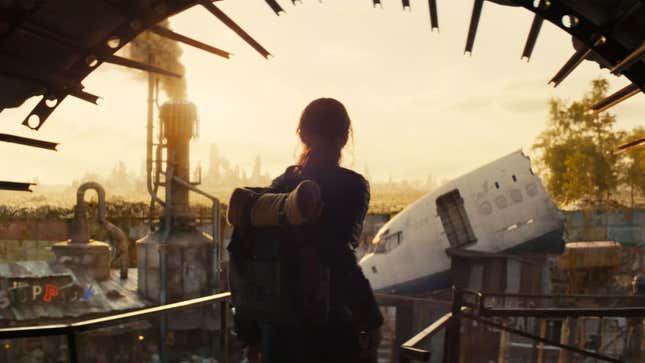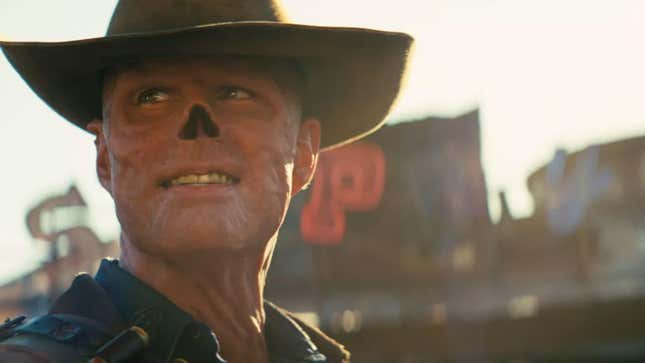
What makes a good video game adaptation? For some, it’s a rock solid story set in a well-known world, but for a very vocal group of gamers, it’s a faithful, beat-by-beat recreation of beloved source material. Those who fall into that latter school of thought are the same people who are angry that Master Chief had sex in the Halo TV series and that The Last of US HBO show focused an entire episode on two minor game characters.
Now, those same kinds of people are mad that Amazon’s new Fallout TV series might have messed with the games’ established canon, and it’s never been more clear that these detractors fundamentally misunderstand what makes an adaptation special. Video game adaptations are most effective when they demonstrate a thorough understanding of the source material, but use that understanding to thoughtfully and cleverly expand beyond any boundaries previously set by lore or canon. And that is precisely why the Fallout TV series is so good—the people working on that show are a mix of dedicated gamers who know the ins and outs of Bethesda’s world, and those who don’t know the difference between a radroach and Rad-Away.
An honest voice makes for a great Fallout series
Fallout star Walton Goggins (who plays The Ghoul) knows how important it is to have people involved in your game adaptation who don’t know shit about the games. During his press tour, he was repeatedly asked if he played any of the Fallout games to prepare for this role, to which he has repeatedly said no, despite his son being a big Skyrim fan.
Speaking with KFC Radio, Goggins expanded upon his decision to go into the Fallout show blind:
I didn’t really know the story and I didn’t know what it was about. When this opportunity came my way, and this long conversation that I had with Jonah (Jonathan Nolan) and Geneva [Robertson-Dworet] and Graham Wagner, our writers, ya know they asked that question…and I thought ‘No, I’ve never played it, and I don’t think I’m going to if that’s okay. I really don’t want to know anything about this game.’ Because I do believe that there needs to be somebody at the table that isn’t influenced by the need to honor certain aspects of this story…There needs to be another kind of voice in that conversation. There were enough people there that were gonna get that right…I just wanted to keep us honest, as honest as we possibly can about what’s happening to these people.
Goggins hits the nail on the head here—an adaptation can only be as strong as the standalone story it tells, and that story needs an honest voice unbeholden to anything that came before it. If you’re too focused on faithfully following canon, you’ll miss chances to tell beautiful stories that go beyond those boundaries. If my father can sit down and enjoy the Fallout series without knowing a damn thing about the video games, if he can be moved by the path Goggins’ character takes, then you’ve made a good video game show.

Adaptations don’t exist to copy and paste the game you really like onto a different medium—they should expand upon that framework and spin riveting stories in a familiar world. The Fallout series has plenty of references to the games—its costumes, weapons, and enemy design are almost all exact replicas, the entire series is steeped in that same bizarre ‘50s tone as the games, and there are plenty of Easter eggs and sly gaming nods to be found in every episode. But the series doesn’t attempt to take a story from one of the games and recreate it for television. Instead, it uses Bethesda’s rich world as a springboard to tell a fascinating tale of an apocalyptic trio who could, arguably, represent the three core Dungeons & Dragons alignments: good (Lucy, played by Ella Purnell), evil (The Ghoul), and neutral (Maximus, played by Aaron Clifton Moten).
As the first season progresses, we see how those ideological alignments are forced to shift and change in this world of nuclear fallout, and how things that might initially appear to be lawful good are in fact, quite the opposite. From the Vault-Tec Corporation and the leaders in the vault-dweller community to the people who are surviving on the surface, nothing in this barren, broken world is what it seems. If this were a carbon copy of an existing Fallout story, gamers would be bored, but instead they’re squabbling over whether or not a timeline has ruined the story of Fallout: New Vegas.
Video game adaptation discourse is exhausting, but if one thing is clear, it’s this: a good adaptation is only as strong as the “honest” voice in the room, the one unbothered by established canon and unworried by what gamers think. That’s why Goggins’ role is so crucial—he not only gives us an award-worthy performance, but he does so from the perspective of someone determined to tell a great story, no matter what it’s based off of. And that’s why the Fallout show is so damn good.





